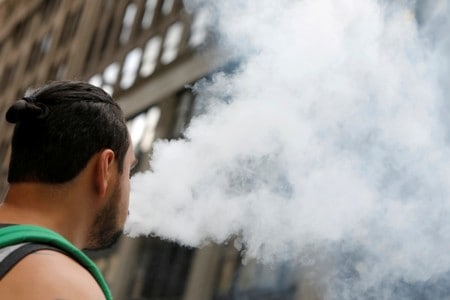By Steve Gorman
LOS ANGELES (Reuters) – California’s governor on Monday ordered a public awareness campaign on health risks posed by a “youth epidemic” of vaping, but said he lacked authority to unilaterally ban flavored e-cigarettes that he said were deliberately marketed to children.
Governor Gavin Newsom, acting a day after New York Governor Andrew Cuomo announced such a ban, became the latest politician seeking to crack down on e-cigarettes and other electronic inhaling – or vaping – devices, which have exposed a new generation of young people to nicotine hazards.
Public health officials have said fruit- and candy-flavored e-cigarettes are luring millions of teenagers into using vaping products and becoming addicted to the nicotine they contain.
The clamor for action has been spurred by a recent nationwide spate of severe lung illnesses that U.S. health officials have linked to vaping of both nicotine and cannabis products.
Nearly 400 cases have been reported, six of them fatal, according to the U.S. Centers for Disease Control and Prevention.
NEW YORK STATE AND CHICAGO
On Sunday, Cuomo said New York state’s health commissioner would formally ban all flavored e-cigarettes besides tobacco and menthol later this week.
President Donald Trump’s administration last week announced plans to remove flavored e-cigarettes from store shelves nationwide.
Chicago Mayor Lori Lightfoot said on Monday she was leading a move to ban the sale of flavored vaping and tobacco products in the third-largest U.S. city.
At a news conference in the state capital, Sacramento, Newsom urged state legislators to send him a bill in its next session banning flavored e-cigarettes in California, saying he lacked the power to impose such restrictions outright.
Instead, he outlined a series of immediate steps “to meet the urgency behind this public health crisis and youth epidemic,” including a $20 million social media campaign to educate young people about health dangers from vaping nicotine and cannabis products.
His executive order also directs agencies in the most populous U.S. state to devise plans to remove illegal vaping products from sale and recommend health warnings that retailers and advertisers of vaping products would be required to post.
In addition, state officials were directed to recommend nicotine standards and uniform packaging for purposes of including nicotine content in the calculation of existing e-cigarette taxes. The governor also signed legislation tightening age verification requirements for the sale of tobacco products.
SURGE AMONG HIGH SCHOOLERS
Newsom said the advent of flavored e-liquids was part of a deliberate strategy to market to children and had essentially reversed gains previously made by public health authorities in curbing tobacco use by young people.
“You don’t have bubble-gun flavor, or mango flavor unless you’re targeting a young audience,” he told reporters.
Newsom cited data showing vaping devices were the most commonly used tobacco products in California and that more than 80% of high school students who consume tobacco do so by vaping.
He also said nearly 87% of California teens who consumed tobacco products reported using a flavored product, and that more than 15,500 e-liquid flavors were on the market.
The share of high school students using e-cigarettes has more than doubled over the past two years, with 27.5% reporting they had tried an e-cigarette in the past month, according to preliminary federal data released last week.
The surge has coincided with the rising popularity of e-cigarettes made by San Francisco-based Juul Labs Inc, now the leading U.S. distributor.
Juul Labs has insisted that it “never marketed to youth, period,” although the company has said it regretted that some of its early advertising “was executed in a way that was perceived as appealing to minors.”
On Monday, Juul Labs spokesman Ted Kwong said the company agreed with the need for “aggressive category-wide action on vapor products,” adding that it had taken “the most aggressive actions of anyone in the industry to combat youth usage.” He said the company pulled many of its flavors from retail stores and suspended its social media accounts last year.
(Reporting by Steve Gorman in Los Angeles; Additional reporting by Chris Kirkham in Los Angeles and Brendan O’Brien in Chicago; Editing by Will Dunham and Peter Cooney)


